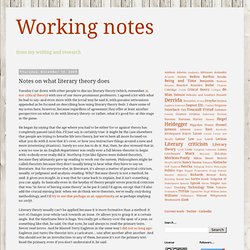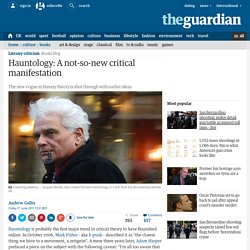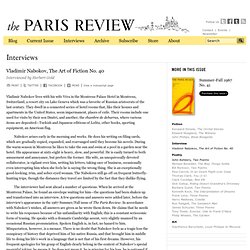

Introduction to Literature and the Environment. Blog Archive » One man’s meat is another man’s Poisson (GRAVITY’S RAINBOW) Working notes: Notes on what literary theory does. Tuesday I sat down with other people to discuss literary theory (which, remember, is not critical theory) with one of our more prominent professors.

I agreed a lot with what he had to say--and even more with the jovial way he said it, with genuine seriousness appended as he focused on describing how using literary theory feels. I share some of my notes here, however, because regardless of agreement they offer at least another perspective on what to do with literary theory--or rather, what it's good for--at this stage in the game. He began by saying that the age where you had to be either for or against theory has completely passed (and this, I'll just say, is certainly true: it might be the case elsewhere that people are trying to breathe life into theory, but we're here all more focused on what you do with it now that it's over, or how you restructure things around a new and more interesting situation).
Surely no one has to do it. He used the example of Lévi-Strauss. Untitled Document. Simpsons at the Gates by Keith Gessen Intimations of the Coming Barbarism Anecdote 1: I am having an argument with my aunt.

An owner of Halliwell's Film Guide, she fancies herself something of a film connoisseur and she does know an occasional thing or two, but when she tells me (it comes up) that the star of Rear Window is Cary Grant, I drop some science on her head. It's Jimmy Stewart, I tell her, look it up. Though it is always a pleasure to annihilate my aunt in argument it feels a bit hollow this time around, for I have never seen Rear Window, neither the old nor the restored version. Lempriere's Dictionary: Amazon.co.uk: Lawrence Norfolk. Hauntology: A not-so-new critical manifestation. Hauntology is probably the first major trend in critical theory to have flourished online.

In October 2006, Mark Fisher - aka k-punk - described it as "the closest thing we have to a movement, a zeitgeist". A mere three years later, Adam Harper prefaced a piece on the subject with the following caveat: "I'm all too aware that it's no longer 2006, the year to blog about hauntology". Two months ago, James Bridle predicted that the concept was "about six months away from becoming the title of a column in a Sunday supplement magazine". Only four months to go, then. My hunch is that hauntology is already haunting itself. Like its close relative psychogeography, hauntology originated in France but struck a chord on this side of the Channel. 40, Vladimir Nabokov. Vladimir Nabokov lives with his wife Véra in the Montreux Palace Hotel in Montreux, Switzerland, a resort city on Lake Geneva which was a favorite of Russian aristocrats of the last century.

They dwell in a connected series of hotel rooms that, like their houses and apartments in the United States, seem impermanent, places of exile. Their rooms include one used for visits by their son Dmitri, and another, the chambre de debarras, where various items are deposited—Turkish and Japanese editions of Lolita, other books, sporting equipment, an American flag. Nabokov arises early in the morning and works. He does his writing on filing cards, which are gradually copied, expanded, and rearranged until they become his novels. During the warm season in Montreux he likes to take the sun and swim at a pool in a garden near the hotel. The interviewer had sent ahead a number of questions. Nabokov is now at work on a long novel that explores the mysteries and ambiguities of time. Good morning. E. No. Wardshelley_scifiSmaller.jpg (3400×1826) My Lost Library - The Chronicle Review. By Ariel Dorfman In the ninth year of my exile, one sullen day in the winter of 1982, the phone rang in our house in Bethesda, Maryland.

When I heard the voice on the other end of the line, I tried to control my panic. I had learned by then that whenever anyone called me or my wife, Angélica, from my forbidden country, Chile, then in the throes of General Pinochet's dictatorship, it had to be bad news. The worst moment of each call was, paradoxically, before I got the alarming news about death or disappearance or torture. In the split seconds between identifying the voice in Chile and that voice speaking up and identifying the victim, a sense of dread would spread inside, a growth heavy with a soon-to-be-answered question: Who is it this time?
The victim was not a human being. "You've lost half your library," Santiago said. "Half my library? "Yes. And that's when the exchange took an even stranger turn. So maybe my bizarre sense of animation came from gratefulness. SearchWorks (SULAIR) If:book, the future of the book. Dystopian Books - Dystopia. 20 Best Websites To Download Free E-Books, Part II. Just PDF - eBooks and Docs.
World Literature.